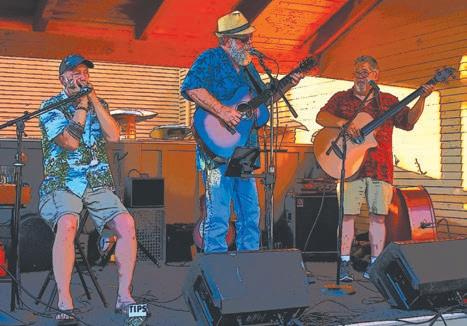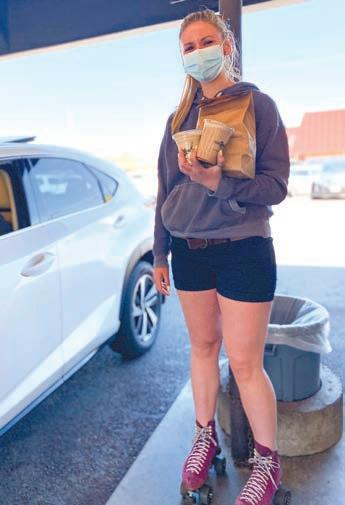
14 minute read
News
NEWS “A Piece of the Puzzle”
A Redmond hotel will soon become the city’s first year-round shelter thanks to funding from Project Turnkey, the statewide initiative to convert hotel and motels into housing
Advertisement
By Hanna Merzbach
Amid rising housing costs and stagnant wages, Central Oregon’s homeless population is growing, and shelter beds are in short supply. But, this June, at least 25 shelter beds will be added to the mix, as Bend-based nonprofit Bethlehem Inn uses state funding to convert a motel in Redmond.
On April 27, Bethlehem Inn received a $2.7 million grant to acquire and convert Redmond’s 37-room Greenway Motel. The grant is a part of Project Turnkey, a $65 million statewide initiative to convert up to 20 hotels and motels into housing for people displaced by the 2020 wildfires or people who are homeless. The Redmond motel—one of 12 projects funded thus far—will shelter unhoused individuals and act as the city’s first year-round shelter.
Bethlehem Inn is no stranger to the model of converting a motel into a shelter, which it did many years ago with experiencing homelessness in Central Oregon during the count. In Redmond, 52 people were homeless at the time. However, service providers say this is a vast undercount and more than 150 may be unhoused in the city.
As Colleen Thomas, chair of the Central Oregon Homeless Leadership Coalition, explained: “From a service provider standpoint, we are definitely seeing an increase in homelessness, especially in Redmond.” Thomas said while Bend is still a hub for homeless communities, many individuals are drawn to Redmond because it’s more rural and “easier to hide.”
Many Redmond campers live under the Juniper trees off of East Antler Avenue, where there’s city, county and Bureau of Land Management land. Every Friday, a team of service providers brings resources such as water, propane, meals and a shower truck to a gravel lot
Courtesy Gwenn Wysling
The Greenway Motel, located on 517 Birch Ave. in Redmond, will open as Bethlehem Inn’s next shelter in mid- to late-July.
its Bend location in 2007. “We’ve seen that (this model) actually makes a lot of sense if you find the right location and the right facility,” said Gwenn Wysling, executive director of Bethlehem Inn. The nonprofit recognized the need for a similar shelter in Redmond, which currently only has a winter shelter, she said.
The Redmond motel, located at 517 Birch Ave. will initially shelter 25 individuals, but when COVID-19 safety precautions are eased, it will house as many as 90 people in bunkrooms. And, like Bethlehem Inn’s Bend location, the new shelter will be high barrier. All residents must pass drug and alcohol tests prior to and during their stay, and they must participate in a five-week case management program that connects them with permanent housing and other resources throughout the region.
According to the 2020 Point-inTime Count, nearly 1,000 people were near these camps. The effort is led by Jericho Road, which provides hot meals and other assistance in Redmond, along with St. Vincent de Paul, Mosaic Medical and Choices Recovery Services.
Bob Bohac, the Jericho Road outreach coordinator, said the new high-barrier shelter in Redmond is “one of the needed pieces of the puzzle,” but the city is still in need of a low-barrier shelter and a tiny home village, both of which the organization is working to open in the coming year or two. In both of these low-barrier options, residents wouldn’t have to take drug and alcohol tests upon entry.
“We believe that it’s much easier to help those individuals if they have safe and secure shelter first, before requiring them to be clean,” Bohac said.
Regardless, service providers see the Project Turnkey-funded shelter as one sign that momentum is building in Central Oregon to address homelessness. According to Thomas, with the Homeless Leadership Coalition, city and state leaders are no longer “turning a blind eye” to these issues.
“At any point that we have an opportunity to increase capacity for shelter beds is a huge win,” Thomas said. “(Project Turnkey) is something that allows communities to really look at what is already in existence and (ask) how do we leverage that to support some of our most vulnerable individuals.”
The City of Bend also applied for Project Turnkey funding to open its first low-barrier shelter. On May 5, a month after scrapping plans to convert a Third Street Motel due to feasibility concerns, city councilors agreed to consider two other northeast Bend motels: the Rainbow Motel on Franklin Avenue and the Bend Value Inn on Division Street. The city is waiting on appraisals for both motels, and, on May 19, will choose one for which to pursue funding, according to Carolyn Eagan, the city’s director of Economic Development.
Eagan admitted that since the city had to restart the funding process, there’s a good chance it will miss out on Project Turnkey funding, since the grants are competitive and must be allocated by the Oregon Community Foundation by June 30. Still, Eagan emphasized that the City of Bend is dedicated to opening a low-barrier shelter and could potentially find other funding sources.
“We know that the camps are popping up, and we know that they are infringing on basic commerce within the city,” she said. “So, we are all-handson-deck, pedal to the metal. Our heart is in finding some solutions to this community need.”
Courtesy of Gwenn Wysling
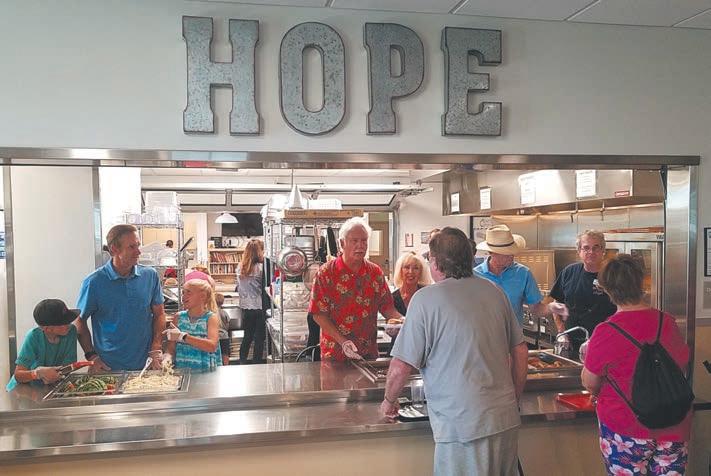
Like at Bethlehem Inn’s Bend location, residents at the former Greenway Motel in Redmond will get three meals a day.
Courtesy Bob Bohac
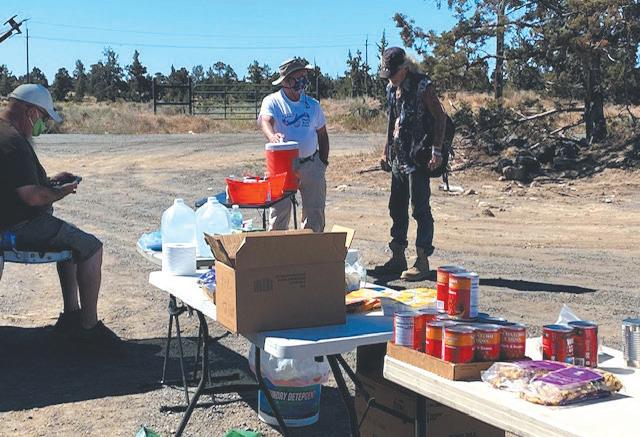
Noticias en Español Un hotel de Redmond pronto se convertirá en el primer albergue de la ciudad abierto durante todo el año gracias a los fondos del proyecto Turnkey
Por Hanna Merzbach Traducido por Jéssica Sánchez-Millar
En medio del aumento del costo de vivienda y el estancamiento salarial, la población de personas sin hogar de la zona Centro de Oregon está en aumento y las habitaciones disponibles en los albergues escasean. Pero este mes de junio, se agregarán por lo menos 25 habitaciones ya que Bethlehem Inn, organización sin fines de lucro ubicada en Bend, utiliza fondos estatales para convertir un motel en albergue en Redmond.
El 27 de abril, Bethlehem Inn recibió una subvención de 2.7 millones para adquirir y adaptar las 37 habitaciones del motel Greenway de Redmond. La subvención forma parte del proyecto Turnkey, una iniciativa estatal de $65 millones de dólares, para convertir hasta 20 hoteles y moteles en viviendas para personas desplazadas por los incendios forestales de 2020 o para personas sin hogar. El motel de Redmond – uno de 12 proyectos financiados hasta la fecha– refugiará a personas sin hogar y será el primer albergue abierto durante todo el año.
Bethlehem Inn no es ajeno a convertir un motel en un albergue, lo cual hicieron hace muchos años con su primer espacio en Bend. El motel Redmond, ubicado en 517 Birch Avenue, al principio albergará a 25 personas, pero cuando las medidas de precaución y seguridad de COVID-19 disminuyan, se albergará hasta 90 personas en literas. Y como Bethlehem Inn de Bend, el nuevo albergue será clasificado de altas barreras. Esto quiere decir, que todos los residentes deben pasar exámenes de drogas y alcohol antes y durante su estancia, y deben participar en un programa de administración de casos de cinco semanas el cual los enlaza con recursos de vivienda permanente y con otros recursos en la región.
Según el conteo 2020, cerca de 1,000 personas vivían desamparadas en la zona Centro de Oregon durante el conteo. En Redmond, 52 personas estaban sin hogar durante ese momento; sin embargo, los proveedores de servicios dicen que este es un conteo muy bajo y más de 150 personas pueden estar sin hogar en toda la ciudad.
Como explicó Colleen Thomas, presidenta de la Coalición de Liderazgo para Personas sin Hogar de la zona Centro de Oregon (Central Oregon Homeless Leadership Coalition): “Viendo las cosas como proveedor de servicios, definitivamente estamos viendo un aumento de personas sin hogar, especialmente en Redmond.” Thomas dijo que mientras que Bend sigue siendo un foco para las personas sin hogar y a muchas de las personas les atrae Redmond ya que es una ciudad más rural y es “más fácil para esconderse.”
Muchos campistas de Redmond viven bajo los árboles de enebro (Juniper), por la calle East Antler Avenue, donde se encuentran terrenos de la ciudad, el condado y la oficina de administración de tierras. Cada viernes, un grupo de apoyo provee recursos como agua, gas propano, alimentos y un camión con regadera, en un terreno con grava cerca de estos campamentos. La labor está encabezada por Jericho Road, que proporciona comidas calientes y otra ayuda en Redmond, junto con St. Vincent de Paul, Mosaic Medical y Choices Recovery Services.
Bob Bohac, el coordinador de extensión de Jericho Road, dijo que el nuevo refugio en Redmond, es una de las piezas necesarias del rompecabezas, pero la ciudad sigue necesitando de un albergue de bajas barreras y una pequeña aldea, en las cuales la organización está trabajando por abrir en uno o dos años. En ambas de estas opciones de bajas barreras, los residentes no tendrían que tomar una prueba de detección de drogas y alcohol al ingresar al albergue.
“Creemos que es mucho más fácil ayudar a estas personas si disponen primero de un refugio seguro, antes de pedirles que estén libres de alcohol y drogas,” indicó Bohac.
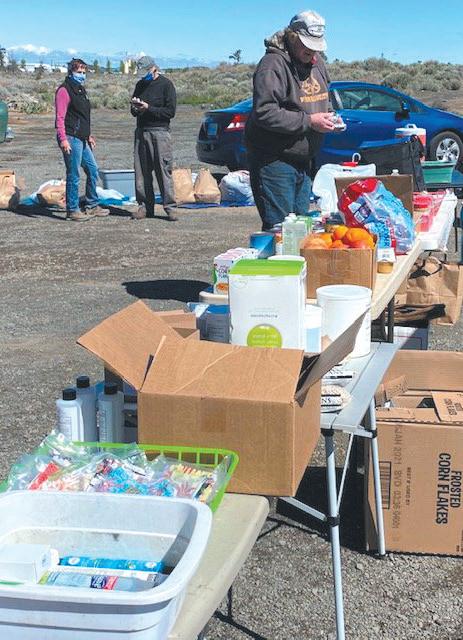






NOW HIRING



Pay $18-21/hour
Send resume’s to karlifoster4@gmail.com or inquire at each location
POSITIONS AVAILABLE AT BOTH LOCATIONS OLD MILL DISTRICT 325 SW Powerhouse Dr | 541.318.9866 Ne Place 1500 NE Cushing Dr | 541.322.9866
now hiring
Bend Park & Recreation District has 35+ full-time, part-time and seasonal positions available and is looking for enthusiastic people who enjoy working with youth or in a recreation environment.
BPRD offers competitive pay and flexible schedules.
Learn more and apply online at bendparksandrec.org/jobs. APPLY ONLINE
•Year-round
Recreation Staff •Summer
Recreation Staff •Lifeguard •Swim Instructor •Custodian •Landscaper
Questions? Call (541) 389-7275 Equal Opportunity Employer
Gun safety bill passes Oregon Senate, now on Gov. Kate Brown’s desk
By Jack Harvel
Senate Bill 554 passed the Oregon State Senate after the Oregon House of Representatives modified the text to add storage and safety requirements. The bill would change Oregon laws to allow school districts, public higher education institutions and a few other public buildings the ability to prohibit the carrying of firearms on their property, even if carried by someone with a concealed handgun license.
“Gun violence is a public health crisis. We’ve lost far too many loved ones to shootings and today we took a meaningful step toward preventing these unspeakable tragedies,” said Sen. Ginny Burdick (D-Portland), who introduced Senate Bill 554.
The bill passed the Senate with a 17-7 vote. It requires firearms stored in the home to be in a gun safe, gun room or secured with a cable lock. Storage containers or cable locks are also mandatory when transporting a firearm. The bill also makes it mandatory to report a stolen firearm within 72 hours of noticing it’s missing.
The original bill would have given local governments discretion in banning guns in their public buildings, but was scaled back to include only educational institutions, the Portland International Airport and the Oregon State Capitol.
“Suicides are increasing. Gun violence is increasing. A firearm that is not safely stored is a threat,” said Burdick. “Whether someone steals that firearm to do harm to another person, or a child is killed because they mistake a weapon for a toy, or someone in an acute mental health crisis accesses a gun – it’s a tragedy, and we can help prevent these tragedies. By passing Senate Bill 554 today, we help prevent these tragedies.”
Some House and Senate Republicans had briefly tried to postpone the vote until late June, but were unsuccessful.
“The bill is not about solving gun violence, but a generalized fear of guns at a time when more and more people need to defend themselves,” Sen. Lynn Findley (R-Vale) told Oregon Public Broadcasting. “People were not given a fair chance to be heard with public hearings wrought with technical difficulties and scheduled at laser speed.” If the bill does go into law it can be challenged and go to a state referendum if opponents are able to gather enough signatures.
Jack Harvel

A bolt lock is one of the methods of safe storage approved by the Oregon Legislature in Senate Bill 554. Guns can also be stored legally in gun safes and gun rooms.
End of Risk Levels Ahead
Oregon to remove capacity limits and county risk levels—if vaccinations reach 70%
By Jack Harvel
Gov. Kate Brown announced Tuesday that Oregon will stop using county risk levels and restrictions on capacity once the state reaches a vaccination rate of 70% or higher for Oregonians aged 16 and above. The governor said she believes the state will hit that target by late June if current trends continue.
“Hospitalization rates have stabilized, our infection rates are on a downward trajectory, and in the race between vaccines and variants, our efforts to vaccinate Oregonians are taking the lead,” Gov. Brown said during a press conference. “With daily vaccination rates reaching over 34,000 per day, we are certainly making headway against this virus, while we know that daily vaccination rate may slowly decline in the coming weeks, this week we will celebrate that 2,000,000 Oregonians have received a first dose, more than half of our adult population.”
The target of 70% wouldn’t be considered herd immunity, Oregon Health Authority Director Pat Allen said Tuesday, but would lower the spread and lethality enough that hospital capacity wouldn’t be threatened. Some mandates, like mask and distance mandates, may remain in place if still supported by the Centers for Disease Control and Prevention.
Under the new plan, individual counties can opt in to the lowest risk categories if they reach a 65% vaccination rate, and submit a vaccine equity plan to the state that shows how they anticipate to vaccinate vulnerable populations.
Deschutes County has fully vaccinated 97,939 people thus far, just shy of half its total population but nearly two thirds of adults.
Room Tax Reconsidered
Council votes to move some tax funds supporting tourism advertising and strategy to tourism facilities instead
By Jack Harvel
The transient room tax in Bend will soon be able to be spent on tourism-related facilities, expanding on its original function for tourism promotion.
Most of the tax, 68.8% of it, goes to the City’s general fund where it contributes to roads, police and fire departments. The other 31.2% is currently restricted to a tourism fund that was responsible for advertising, strategic planning and operations for Visit Bend, the agency tasked with tourism promotion. The change brings Bend more in line with state law on the allocation of tourism funds.
“The state law is really clear in that the tourism-related facilities really have to be those that continue to attract visitors and tourists to your community or support new visitors that come to your community—they’re really specific about the types of facilities that can be used with these tourism funds,” Carolyn Eagan, director of Economic Development for the City of Bend, said in a work session with the Bend City Council.
Things like community centers, sports facilities and trailheads would be considered tourism-related facilities and could be supported with the transient room tax—the council has not yet discussed specific projects yet, and funds will be approved annually along with the Visit Bend business plan.
“One of the real requests from the industry is that the funds that are allocated to tourism-related facilities are allocated similarly to the way that tourism promotion funds are allocated so that it is the industry who is working to get the proposals for those tourism-related facilities and getting to prioritize those,” Eagan said.
The transient room is a 10.4% tax levied on every night’s stay at a professional lodging company, including hotels, motels, bed and breakfasts and Airbnbs.







